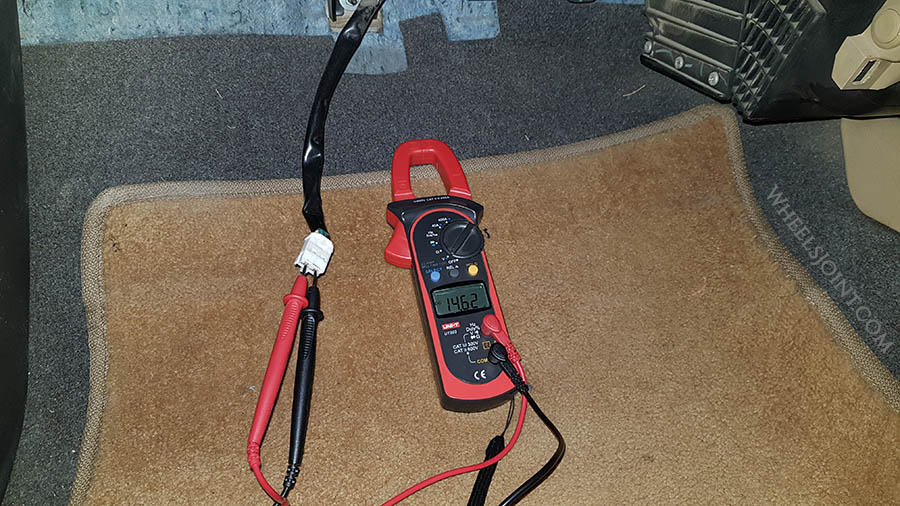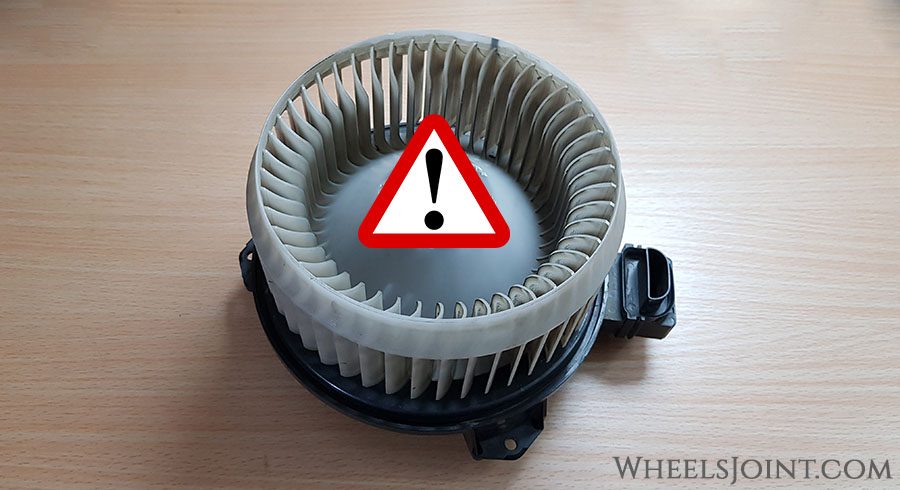The blower motor is the central component of the air conditioning system in Mercedes-Benz GLS, responsible for blowing hot or cold air through the AC vents. If the blower motor stops working due to a fault, the air will not flow out of the vents when you switch on the AC in your GLS.

The most common causes for AC fan blower motor not working in Mercedes-Benz GLS are blown fuse, bad relay, resistor or control module malfunction and faulty blower motor. However, a bad electrical connector or broken wire, or a defect in the climate control unit can also cause the blower motor to stop working.
1. Blown fuse
The AC blower motor in Mercedes-Benz GLS needs electricity to work. In case of a faulty fuse, the circuit is interrupted and the motor can not work.
Check the owners manual of your GLS or the fuse box cover to find the exact location of the fuse for the blower motor. If the fuse is blown, replace it with a new one with the specified amp rating.

To check the fuse, pull it out of the fuse box using a fuse puller or needle nose plier and hold it against the light. If the metal strip is broken in the middle, the fuse has blown. You must replace it with one of the same amperage and therefore the same color. It does not matter in which direction you insert the fuse.
2. Bad relay
Relays are electromagnetic switches that are used to switch electrical loads on and off. A bad relay can also be the cause of AC blower motor failure in your Mercedes-Benz GLS.
First of all, you should find out where the blower motor relay is located in your particular model of GLS. The information may be listed in your vehicle’s owners manual. Typically relays are located in the engine compartment or under the steering wheel on the left-hand side. If you are lucky, the wiring diagram will be drawn on the facing. You can test the relay by swapping it with other relays in the fuse box with similar amp rating. But before you begin the replacement, it is highly recommended to disconnect the vehicle’s battery.
Note: Vehicles with auto climate control may not have a blower motor relay.
3. Bad resistor or control module
The function of the blower motor resistor is to control the speed of the blower motor. When you increase or decrease the AC fan speed in your GLS, the climate control unit signals the resistor module to increase or decrease the flow of electric current to the blower motor. If the resistor module develops a fault, it can cause the blower motor to stop working.
The resistor is typically located under the passenger side dashboard, near the blower motor.
What causes blower motor resistor to fail in GLS?
A struggling blower motor due to internal component degradation can put a lot of strain on the resistor when in operation, causing it to overheat and burnout. Therefore it is generally recommended to replace the old blower motor in GLS as well when replacing the resistor.
Will a blower motor work if the resistor is bad?
Yes, the blower motor can still be operative after the resistor goes bad, but it may only work at high speed, or remain stuck at one fan speed. However, if the resistor has burned out due to overheating, the blower motor may cease to function.
Testing the blower motor resistor
There are many ways to test a resistor, but the most easiest and basic method is to check the voltage at the electrical connector on the blower motor with a multimeter. Follow this procedure after you’ve ruled out any problem with the blower motor fuse or relay.
- Locate the blower motor in your GLS, typically located under the passenger side dashboard.
- Remove the electrical connector from the blower motor.
- Turn on the multimeter and insert the probes into the connector, one at each point making sure the metal part of probes don’t touch each other – otherwise it will short out and blow up the fuse, and may cause damage to the vehicle’s electrical system.
- Turn on the AC fan in your GLS.
- The output voltage on the multimeter should read around 12 volts.
- If you do not see any volts, or if you only see volts at certain fan speed setting, it could be due to a bad resistor.
- If the volts reading is normal, then the fault probably lies with the blower motor itself.

4. Faulty blower motor
When you turn on the AC fan in your GLS, and the air does not flow out of the vents, or the airflow is poor or inconsistent, it could be due to a broken blower motor.

Early signs of blower motor failure
Blower motors can fail at any time without warning, but usually there are early signs before they stop working. The most common signs of failing blower motor in Mercedes-Benz GLS are unusual whirring noises coming from behind the dashboard when air conditioner is in operation, weak or inconsistent airflow, and in rare cases a burning plastic odor or smoke coming from AC vents especially when fan speed is set to high.
How to test the blower motor
- Unplug the electrical connector from the blower motor.
- Turn on the multimeter and insert the probes into the connector, one at each point making sure the metal part of probes don’t touch each other.
Note: You can also use a test light. - Turn on the AC fan in your GLS.
- The output voltage on the multimeter should read around 12 volts.
- If the volts reading is normal, it indicates a fault in the blower motor.
The more accurate way to test if the blower motor is bad in Mercedes-Benz GLS is to connect it directly to a 12 volt battery using alligator clip test cable. If the motor does not spin after directly connecting to the battery, it confirms that the blower motor is dead and should be replaced with a new one.
Recommended video
How long do AC blower motors last?
The AC blower motor is not part of the regular maintenance on GLS, you replace it when it dies. Blower motors are maintenance-free and can easily last for over 10 years, but they can fail earlier due to overheating, moisture damage or manufacturing defect. Also, over time the bearings of the blower motor can lose their initial lubrication and begin to dry out, causing increased friction in the motor. When this happens, you may hear unusual whirring or droning noises from behind the dashboard.
5. Bad connector or broken wire
A bad connector on the blower motor or the resistor module, or on the climate control unit can interrupt power supply to the blower motor in GLS. Additionally, a damaged wire in the circuit, including the wire from the fuse box, can also cause the blower motor to stop working.
Rodent damage
Rodents, such as rats or mice, can get under the hood or even make their way inside the dashboard of your GLS and chew on wire coatings, which can cause all sorts of electrical problems. If bite marks are discovered, carefully examine all the cables and hoses for damage, including electrical wires for the blower motor.

6. Defective climate control unit
Climate control module is the brain of the air-conditioning system in your Mercedes-Benz GLS, also responsible for turning on and controlling the speed of the blower motor. In rare cases, a fault in the climate control unit can cause the blower motor to stop functioning properly.
Conclusion
There are many reasons why the AC blower motor may not be working in your Mercedes-Benz GLS. When looking for the reason, you should always start with the most obvious cause, blown fuse or faulty relay.
In any case, it is advisable for laypersons to visit a workshop as you can easily do more damage to your vehicle, especially to the electrical system. A professional mechanic can swiftly diagnose the issue for you.









